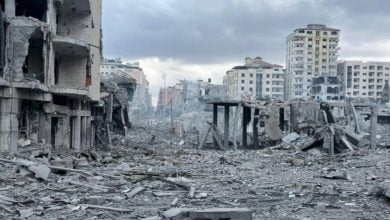From July 12-13, nationwide rallies took place in hundreds of cities against immigration concentration camps and ICE raids.
More than 10 of those demonstrations took place across the state of Arizona. From Phoenix, the state’s most populous city of 1.6 million, to Show Low, a small town of 10,000, large crowds turned out to protest the torturous conditions migrants and refugees are held in.
The greater Phoenix area alone is host to seven ICE detention facilities. This has fueled growing resentment and anger in the community.
Adding more fuel to the fire, three days before the slated nationwide rallies, NBC News broke a story detailing nightmarish accounts by migrant children held in the massive Yuma, AZ concentration camp. The report, based on accounts collected by government case managers, spoke of sexual assault and retaliation at the hands of U.S. Border Patrol agents, overcrowding and unsanitary conditions.
It is no surprise, then, that thousands of enraged community members took to the streets of downtown Phoenix on the evening of July 12. Gathered along Central Avenue they chanted “Abolish ICE!” and “Close the Camps!” while Phoenix police attempted to contain and disperse rapidly growing numbers.
The protest sought to shed light on the mistreatment, abuse and death happening at camps such as the one located in Yuma.
For instance, in a case reminiscent of the abuses that took place at the Abu Ghraib prison complex against Iraqi detainees by U.S. guards, a 15-year-old girl from Honduras described being sexually assaulted by a large, bearded officer who groped her inside her bra while other officers watched and laughed. Customs and Border Patrol refused to state whether this agent, now under investigation, is still working with children, a virtual admission that he is.
Every single child who spoke with a government case manager upon release was illegally held longer than the 72 hours permitted by law, and described being called offensive names, being denied phone usage, showers, mattresses, blankets, pillows and food. The children did not know if it was day or night because the lights were on 24-hours. Guards would kick children awake and throw food at them “like they were wild animals,” according to an attorney from the Florence Immigrant & Refugee Rights Project.
At the July 12 protest, Phoenix demonstrators eventually broke through police barricades, marched down Central Avenue and took control of an intersection, shutting down traffic and the light rail. A standoff with the police, dressed in full riot gear, ensued.
In the face of police intimidation, protesters held the street for an hour demanding, “Free those Kids!”
The first wave of police attacks happened about 25 minutes into the standoff. They violently charged the crowd, indiscriminately shoving men, women and children to clear the tracks. Several people were injured. Screams of terror could be heard as the police nearly trampled the least mobile within the crowd.
In response, a group of protesters sat down and locked arms. They held this position for another 30 minutes while others stayed on the streets, chanting and holding signs. The police eventually closed in on them, arresting a total of 16.
All of them were charged with misdemeanors of unlawful assembly and obstructing a public thoroughfare. These charges have been dismissed, though a defense attorney for several protesters believes they may be refiled.
Two protesters, however, were also hit with the cop’s customary counterfeit charge of “aggravated assault on a police officer,” routinely fabricated to deceive the public and demonize protesters.
Of note, the amount of money needed to bail out all of the arrested was raised online in less than 24 hours from sympathizers.
The events in Phoenix, including the courageous standoff with police thugs that resulted in 16 arrests, as well as the post-arrest solidarity, signifies the growing determination of a movement in solidarity with all migrants and refugees, not just here in Arizona, but across the country.






